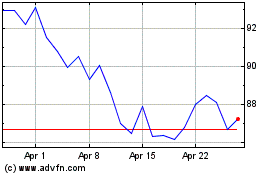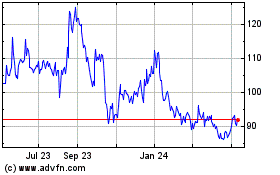By Felicia Schwartz and Dov Lieber
TEL AVIV -- As Israel leads the world in vaccinating against
Covid-19, the neighboring West Bank and Gaza are grappling with the
prospect of waiting months to inoculate their people, raising
political and public-health questions about Israel's
responsibilities to the Palestinians.
The contrast could hardly be more stark.
Israel's Prime Minister Benjamin Netanyahu said Thursday the
country is receiving more of the vaccine developed by Pfizer Inc.
and BioNTech SE beginning on Sunday and will be able to vaccinate
its population by the end of March, or possibly before. The
vaccine's makers say it takes two doses to be fully effective.
Israel -- a wealthy country that boasts of a technologically
advanced health-care system -- has administered the first shot to
more than 18% of its roughly nine-million population since paying a
premium for early shipments and beginning its program on Dec.
20.
While other countries, including the U.S., have administered
more doses, none has vaccinated a larger percentage of its
population.
The West Bank and Gaza depend on aid to survive and have poor
health and logistics infrastructure. They are expecting the World
Health Organization's Covax program to provide vaccines for 60% of
their combined five-million population, but only a portion of those
will be free and it is unclear when the first batch will arrive.
They have asked others, including Qatar and the European Union, for
assistance, and are also speaking to some vaccine developers
directly.
"I hope that our bad political situation won't affect the
supply," said Alaa Shehada, 37, who runs a cafe in Gaza City but is
struggling to stay in business amid the pandemic.
The WHO said it won't deliver any vaccines through the Covax
program until March at the earliest.
For Israel, the differing pictures raise questions about its
obligations to Palestinians living in the West Bank and Gaza --
which are partially self-governed territories but whose borders are
effectively controlled by the Israelis. Israel has occupied the
West Bank and Gaza since the 1967 Arab-Israeli war. Both Egypt and
Israel imposed a blockade on Gaza when Hamas, an Islamist militant
group considered by the U.S. and Israel to be a terrorist
organization, seized control of the strip in 2007.
Israeli officials say the Palestinian Authority has
responsibility for its citizens' health care, including procuring
vaccines, under the terms of the 1990s Oslo Accords. Israel might
provide excess vaccines to the Palestinians once its population is
inoculated, they added.
But human rights organizations say that under the Geneva
Conventions, Israel must provide vaccines to those living under its
control.
Even if Israel succeeds in vaccinating much of its population,
the coronavirus could still be a risk as long as it continues to
spread in the West Bank and Gaza. Tens of thousands of Palestinians
enter Israel and the Jewish settlements in the West Bank for work,
mainly in the construction sector, every day.
"We will think how we can cooperate with the Palestinians on the
issue of vaccination," said Yuli Edelstein, Israel's Minister of
Health. "Not because we have some, you know, some responsibility or
commitment, but because it's an Israeli interest."
Mr. Edelstein said Israel has assisted the Palestinians with
medical equipment during the pandemic and would look for ways to
cooperate with the Palestinians on vaccines once Israel's
population is inoculated.
Through its state-run health-care system, Israel is providing
vaccines to all Israeli citizens, including Jewish settlers who
live in the West Bank, in addition to Palestinians who are
residents of East Jerusalem.
There is also the question of whether the Palestinians would be
able to use the same vaccines being rolled out in Israel.
Dr. Ahmad Majdalani, a close aide to Palestinian Authority
President Mahmoud Abbas, said that the Palestinian Authority didn't
ask Israel for vaccines because Israel is mainly relying on
Pfizer's vaccine, which requires storage at ultralow temperatures.
The Palestinians don't have the infrastructure to manage that
properly.
Israel has purchased eight million doses from Pfizer. The
government hasn't disclosed how many doses it has received so far,
though health officials estimate the figure is around four million,
for which it paid $62 a dose, an Israeli health-ministry official
told public broadcaster Kan. Israel begins its second round of
inoculations for people who have already received the first dose
this weekend.
It has bought six million doses of the vaccine developed by
Moderna Inc., which must also be kept at ultralow temperatures. It
has also ordered 10 million doses of the vaccine developed by
Oxford University and AstraZeneca PLC, which can be stored and
transported more easily using normal refrigeration, making it
easier to distribute in poorer countries with less sophisticated
health-care infrastructure.
WHO officials said the Moderna and University of
Oxford/AstraZeneca vaccines will be among those delivered to the
West Bank and Gaza under its Covax program. But distribution could
be complicated by the leadership split between the West Bank and
Gaza. The Palestinian Authority controls the West Bank and Hamas
controls the Gaza Strip, with relations between the two still tense
after more than a decade of failed reconciliation efforts.
The Palestinian Authority will supply the vaccines, which will
go through Israel's Erez border crossing. Dr. Majdi Dehair, deputy
director of general care at Gaza's Ministry of Health, said health
ministries in the two territories have agreed that the Palestinian
Authority would then provide 40% of the Covax vaccines to Gaza and
keep the rest for the West Bank.
"We are in Gaza, sure it will take a year, not a month," said
Lina Mohammad Abu Daff, a 44-year-old Gaza City resident who works
at the local health ministry.
She said coronavirus spread quickly among her friends, family
and co-workers. Across the West Bank and Gaza, more than 144,000
cases have been reported since the beginning of the pandemic, and
over 1,500 deaths.
Ms. Abu Daff said her 70-year-old father and young niece only
recently recovered. "Of course, it will take time to get the
vaccine," she said.
Meanwhile, Palestinian officials in the West Bank said they are
also discussing purchasing vaccines directly from AstraZeneca in
addition to those coming from the WHO. They expect deliveries by
February if a deal is reached. Palestinian officials had been in
discussions with Russia to purchase four million doses of its
Sputnik vaccine but it isn't clear if or when that vaccine will
arrive.
--Anas Baba in Gaza City contributed to this article.
Write to Felicia Schwartz at Felicia.Schwartz@wsj.com
(END) Dow Jones Newswires
January 07, 2021 15:16 ET (20:16 GMT)
Copyright (c) 2021 Dow Jones & Company, Inc.
BioNTech (NASDAQ:BNTX)
Historical Stock Chart
From Mar 2024 to Apr 2024

BioNTech (NASDAQ:BNTX)
Historical Stock Chart
From Apr 2023 to Apr 2024
